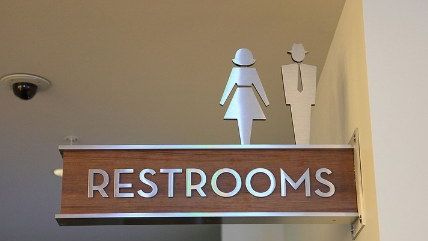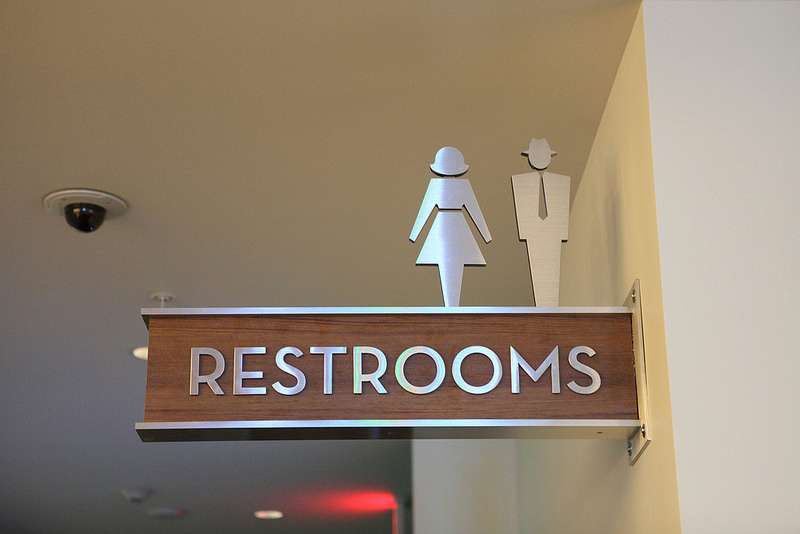South Dakota Governor Rejects Transgender Bathroom Panic—With a Conservative Argument
Bill would have forbidden students from using facilities of opposite sex.


South Dakota's legislators passed a law through both houses earlier in the year that forbid public schools from accommodating transgender students by allowing them to use the restrooms and locker rooms that did not match their birth sex. It was the first law of its kind, obviously opposed by transgender activists. But it wasn't certain whether Republican South Dakota Gov. Dennis Daugaard would sign the legislation.
In the midst of Super Tuesday he made his decision: Nope. He vetoed the bill, and his reasons for doing so were a reminder to conservatives that they're supposed to be in favor of local control of government and schools, not orders from high. From his veto letter:
"HB 1008, does not address any pressing issue concerning the school districts of South Dakota. As policymakers in South Dakota, we often recite that the best government is the government closest to the people. Local school districts can, and have, made necessary restroom and locker room accommodations that serve the best interests of all students, regardless of biological sex or gender identity,"
"This bill seeks to impose statewide standards on 'every restroom, locker room, and shower room located in a public elementary or secondary school.' It removes the ability of local school districts to determine the most appropriate accommodations for their individual students and replaces that flexibility with a state mandate."
The representative who sponsored the bill defended it as a solution that was intended to be "non-discriminatory." He nevertheless has asked his peers not to overturn the veto because of the bad publicity the legislation has brought the state.
Setting aside the bathroom panic, perhaps a non-discriminatory solution would be more about respecting the individual privacy of all students being forced to spend their days as guests of the state, regardless of how they express their gender identity. You don't have to be questioning your birth gender or "transitioning" to not be comfortable with peers looking at your body, especially as a teen. (I personally, as a high school student, fulfilled some of my gym requirements in summer school in part so that I could just go home afterward and not have to use the locker room.)
Right now, the debate is infused with such an "us vs. them" culture war mentality that both sides are happy to cheer on the dispute rather than figure out what an acceptable accommodation might mean. We have the bathroom panic crowd who argue that accommodation would be used by evil men intent on victimizing women, without much evidence that such a thing would happen. (For that matter, even if it did, that's a terrible reason for not accommodating others, because it collectivizes the conditions for individual liberty. It's akin to "stop and frisk" efforts to fight crime.)
But I do worry that argument from some transgender activists and allies is less about being left alone to express their gender as they desire, as every human should be permitted, and more about a demand that everybody around them celebrate and participate in the journey and attempting to use the state as a tool to bludgeon opponents into submission. I support obligating schools, prisons, and other government agencies accommodate transgender people's journey because it's the government, they force us to interact with them, they take transgender people's money just like everybody else's, and they can damn well respect their gender expression.
Everything else is a matter of cultural debate and negotiation, and right now it feels awfully shrill and entrenched. Everybody wants to use the law to fix it. Such a method therefore requires a constant fight for control over the levers of power. Trying to shame the "bathroom panic" people as bigots seems to be a poor strategy, particularly given the big victory in Houston in fighting its pro-transgender ordinance.
I do get it—there's an underlying subtext that these people would prefer that they never interact with transgender people at all or that they didn't even exist. This was the same subtext under a lot of anti-gay arguments (when people argue that acknowledging or even permitting gay relationships encourages others to "become" homosexual, I guess I wouldn't even call that subtext).
Despite these current fights, there have been significant cultural shifts in how people perceive and react to transgender individuals, and it's improving. It's the "I know a transgender person" phenomenon that used to be the "I know a gay person" phenomenon. Polls show that people are likely to have more positive opinions toward transgender individuals if they know one. The difference is striking. A poll from last year found a 53-percentage point improvement in positive impressions of transgender people between those who personally know them and those who do not.
Cultural engagement is more likely to help transgender people get what they want and subsequently help pave the way for transgender teens in public school (which, reminder: an extremely new phenomenon) to be accommodated and to maybe avoid the pursuit of government force as a solution on either side.


Show Comments (319)